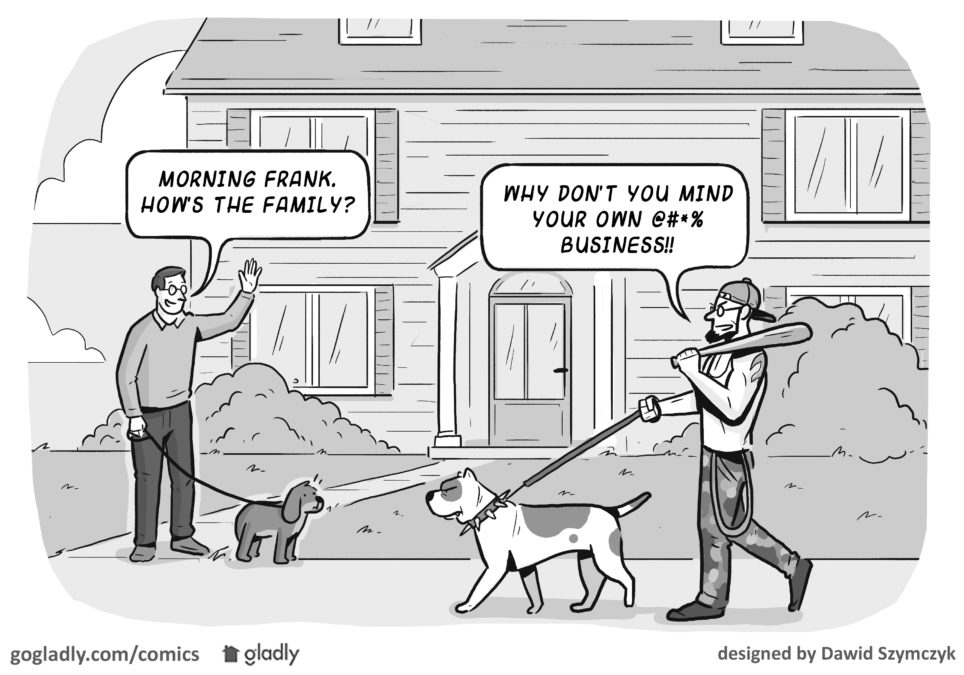If you interact with 20 people in a business day, 19 may be pleasant encounters. But if just one is extremely disagreeable, that interaction will probably stick in your mind. You may replay it over and over throughout the day, while you think of the clever replies you wish you had said at the time. At worst, the encounter may gnaw on you after working hours and even disturb your sleep.
It’s fair to say that you have allowed that person to take up space in your mind. And as a Community Association Manager, it should disturb you even more that they’re not even paying a fee for the precious real estate in your head.
The High Conflict Personality
When I started as a new CMCA dealing with homeowner issues, I was surprised to discover that some people didn’t seem to want a peaceful resolution. Instead, they appeared to enjoy conflict and try to increase or prolong it. Any attempt to bring the matter to a close brought resistance and caused them to raise new issues.
Bill Eddy, a licensed professional as both a therapist and attorney, observed this phenomenon when dealing with such individuals in workplace or family disputes. He came to understand that it was not the pressure of the current issue at hand that would cause their extreme behavior, but that these personalities created conflict no matter what the circumstances. To gain a better understanding of this behavior, he engaged in a detailed study of these types, who he termed High Conflict Personalities (HCP).
As a result of his observations, Mr. Eddy devised a process to get control back from HCP’s during a difficult encounter, and contain their destructive actions. But first, he found, you must accept that you cannot change their conduct or even help them gain insight on their unproductive behavior. Their patterns are imbedded, unconscious and automatic. Again, the key word with HCP’s is containment, not rehabilitation. If you expect them to suddenly see the light and repent from the error of their ways, like Jake in the Blues Brothers movie, you will be disappointed.
How Should You Respond?
Instead, Bill Eddy advises you to use a B.I.F.F.* response: brief, informative, friendly, and firm.
Brief — reply briefly and succinctly. You don’t want to get in a dialog with the HCP, since any extra commentary only adds to the probability of an angry response and provides fuel to take the conversation off track.
Informative — Simply reply to the question, correct the inaccurate statement, or state your policy firmly with no unnecessary elaboration. The main reason you are responding is to correct their erroneous statements or expectations. Focus on the facts and the accurate statements you want to make instead of the inaccurate statements the other person made.
Friendly — Using a friendly response will increase your chances of bringing the matter to a close (i.e. beginning with “thank you for contacting us”). At least be neutral – no sarcasm, threats, and personal remarks about the other person, no matter how unreasonable they are being. Don’t let them bait you into responding emotionally, or give them a reason to get defensive and keep leveling new accusations.
Firm — After you have conveyed your information, then close the discussion. Sound confident and don’t ask for more information. Mr. Eddy advises that in cases where you need a response to a specific question, phrase it as a “yes or no” question and ask for a response by a certain date and time.
Not Every Irate Person is a HCP
It is important to remember that not all difficult people are high conflict personalities. You need to make a distinction between an HCP and someone who may be truly upset about the matter at hand, but are willing to work with you cooperatively. If you respond with understanding and helpful guidance and the other party is receptive, you can provide excellent service and perhaps even improve the relationship. But if you find yourself dealing with an HCP, you now have a roadmap. By following it, you may even be able to evict them from that rent-free space in your head.
*For more information on BIFF Responses, see Bill Eddy’s book BIFF: Quick Responses to High Conflict People, Their Personal Attacks, Hostile Email and Social Media Meltdowns.
- Desperately Seeking Conflict - June 14, 2019
- The Role of HOA Management — Hang Up Your Super Suit - December 13, 2018
- Jerry Springer is NOT on the Agenda!
Taking Control of HOA Meeting Conduct - May 16, 2018



 Help
Help
I presently have three HCP but in two communities. Your advise is right on the money. Thank you for confirming something that took me years to learn.
How do I deal with someone in the office who can’t get past placing blame on everyone else when it clearly her fault or even better stop the blame game and simply admit an error exists it is from her desk and takes the directive provided to fix the matter. The juvenile defensiveness Is old, she’s in her 40s. Thank you in advance.
Hi Barby, I’m so sorry to hear that you’re dealing with that! I’ve had similar experiences and wish that I could say that I’ve always handled it well but I definitely haven’t. Take a look at the article below. I think that it offers some good advice that I wish I follow in previous experiences:
https://work.chron.com/deal-person-blames-others-workplace-3820.html